We Go The Extra Distance For Our Clients
Class Action and Product Liability Practice Areas
Sandy Springs Philips CPAP Lawsuit Attorney
The Sandy Springs CPAP lawyer team at Ashenden & Associates represent individuals affected by recalled machines such as the Philips CPAP and BiPAP machines. These respiratory care devices, used to treat sleep apnea and other respiratory conditions, were recalled due to potential health risks from the polyester-based polyurethane PE-PUR foam degradation used for sound insulation. The defective foam can release harmful particles or gasses into the airway.
Our experienced Sandy Springs Philips CPAP recall attorney team is dedicated to assisting those who have experienced health issues related to the recalled CPAP machines, such as respiratory problems, headaches, or even cancer risks. If you or a loved one have suffered from the use of a recalled Philips CPAP machine, the Philips CPAP recall lawsuit attorneys at Ashenden & Associates are here to help you pursue compensation for medical expenses, lost wages, pain and suffering, and other damages. Our Philips CPAP lawsuit attorneys are committed to holding manufacturers accountable and advocating for your rights.
If you or a loved one in Sandy Springs has been impacted by the Philips CPAP recall, contact the Sandy Springs personal injury attorneys at Ashenden & Associates today. As experienced personal injury attorneys, we understand how complex product liability cases can be, especially those involving defective medical devices.
Don’t wait to take legal action–speak with a Sandy Springs Philips CPAP lawyer today. Call 770-394-8909 to schedule a free consultation with an experienced product liability attorney.
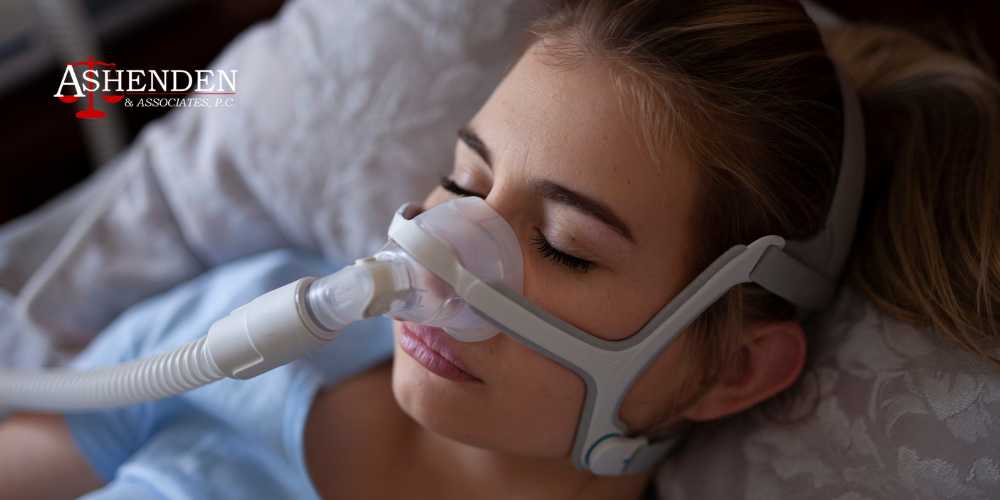
Philips CPAP Lawsuit Update 2024
Philips CPAP recall lawsuits involving the Philips Respironics CPAP machines have been ongoing since 2021 and are continuing to develop. Below are some of latest Philips CPAP lawsuit updates as of August 2024.
Throughout 2023, Philips CPAP class action lawsuits against Philips Respironics have grown, with more individuals joining the legal battle. The Philips CPAP lawsuits allege that Philips Respironics was negligent in designing and manufacturing the respiratory care devices, failed to warn consumers of the potential health risks, and delayed the massive Philips CPAP recall despite knowing about the defects.
As a result, plaintiffs claim to have suffered health issues requiring additional medical treatment, with some experiencing significant financial burdens due to lost wages and medical expenses.
The number of new CPAP recall lawsuits being added to the Philips CPAP recall MDL has been decreasing over the past few months. Additionally, some cases against Philips Respironics have been dismissed, bringing down the total number of pending Philips CPAP lawsuits in the CPAP multidistrict litigation to 748.
This number may seem extremely low, but it can be a bit misleading, as there are tens of thousands of Philips CPAP lawsuits in the registry. The MDL (multidistrict litigation) in this case is being handled by the U.S. District Court in the Western District of Pennsylvania, and it consolidates all current liability claims regarding the defective CPAP machines.
CPAP lawsuit attorneys representing the victims have met with the judge presiding over the case to discuss the status of the Philips CPAP lawsuit. They discussed the possibility of trials starting in early 2025.
Earlier on in the process, Philips Respironics discussed wanting to reach a Philips CPAP settlement in 2024 with the victims who had previously chosen to file a CPAP lawsuit, but that seems unlikely based on the current state of the case. However, CPAP lawsuit attorneys will continue to fight to ensure victims receive full and fair compensation, regardless of how long it takes.
As of now, at least 560 deaths have been linked to the recalled Philips Respironics devices. Overall, there are nearly 120,000 individuals who have suffered from serious injuries as a result of the defective CPAP devices.
Additionally, another device from Royal Philips NV has been recalled out of concern for defective components. This continues to paint Philips as a potentially negligent product manufacturer.
Polytech, the company that developed the PE-PUR foam for the recalled machines, has filed a motion to dismiss regarding their liability in this situation. However, this motion failed, since they specifically modified their PE-PUR sound abatement foam for use in the Philips CPAP machines.
Philips has announced that it would discontinue the sale of all of their Philips sleep apnea CPAP And BiPAP devices, which will cost the company hundreds of millions of dollars. Philips made this agreement with U.S. federal regulators over the mounting health concerns regarding their CPAP and BiPAP devices.
Philips has attempted to blame the PE-PUR foam degradation in their products on SoClean, a company that produces ozone-cleaning products for CPAP machines. However, these allegations are weak and are an attempt to shift focus away from them and their liability in the situation.
The number of new cases being added to the Philips CPAP recall MDL is dwindling. In other news, Philips has recalled an MRI system, which is just another defective medical device recall added to their long list of dangerous medical devices.
After a year of meteoric growth, the number of new cases being added to the Philips CPAP lawsuit has slowed from about 50 new cases a month to about 10-15 new cases. There haven’t been many new developments on the CPAP lawsuit since the Philips CPAP settlement agreement in September.
Philips Respironics recalls two ventilators over concerns of defective circuit boards that don’t meet FDA standards. Additionally, Philips continues to claim that the PE-PUR foam degradation within the recalled Philips CPAP devices have not been successfully linked to serious health risks and is likely harmless. The victims in these cases beg to disagree.
Philips agrees to pay $479 million to handle economic claims regarding the CPAP recalls. While this helps victims recover compensation for certain economic losses, it does not help with the personal injuries and wrongful deaths caused by a recalled Philips device. This comes as no surprise to the attorneys in the case since the economic claims had to be addressed first before the other claims could be settled.
Philips CPAP Recall Refund
The Philips CPAP recall refund is a process initiated by Philips Respironics to provide compensation to users affected by the recall of certain CPAP sleep apnea machines. In September 2023, Philips agreed to pay $479 million to owners of the recalled CPAP and BiPAP machines, compensating them with:
- A device payment award, which covers the initial cost of the machine
- A device return award of $100 for returning one of the recalled sleep apnea machines (the device must be returned to Philips by August 9, 2024)
- A device replacement award, which covers the cost of replacing Recalled Philips CPAP machines with comparable devices (the new medical device must have been purchased on or after June 14, 2021, and before September 7, 2023)
Individuals who believe they are eligible for one or more of these awards can follow the instructions online to determine what steps they need to take to receive compensation.
It’s important to note that this compensation only covers the cost of replacing the CPAP machines recalled. It does not include compensation for victims who have suffered from personal injury or wrongful death as a result of the recalled Philips CPAP machines.
Philips CPAP Recall Replacement Schedule
Individuals who are looking for reimbursement for their economic losses in relation to the recalled CPAP machines have until August 9, 2024, to file a CPAP claim. This includes those looking for reimbursement for the initial cost of the medical device, reimbursement for the cost to replace the recalled device, and an award for returning the device to Philips.
What is a CPAP Machine?
A Continuous Positive Airway Pressure (CPAP) machineis a medical device used in the treatment of sleep apnea, a condition characterized by repeated interruptions in breathing during sleep. CPAP stands for Continuous Positive Airway Pressure, and these machines work by delivering a steady stream of air through a mask to keep the airways open, preventing sleep apnea events.
Philips Respironics, a division of the multinational technology company Philips, is one of the leading manufacturers of CPAP machines. Their devices are designed to help individuals with sleep apnea maintain regular breathing patterns while sleeping, thereby reducing the risk of complications associated with untreated sleep apnea, such as high blood pressure, heart disease, and daytime fatigue.
CPAP machines are just one of three positive pressure machines used in treating sleep apnea. Bilevel Positive Airway Pressure (BiPAP) machines are another popular option for those with sleep apnea. While Philips BiPAP machines are similar to Philips Respironics CPAP machines in their structure and purpose, they function a little differently.
Unlike a Philips Respironics CPAP machine, which delivers continuous positive airway pressure, a Philips BiPAP machine provides two different levels of air pressure: a higher pressure during inhalation and a lower pressure during exhalation. This dual-pressure system can be beneficial for individuals who find it difficult to exhale against a single continuous pressure or for those who require higher pressure settings to maintain open airways.
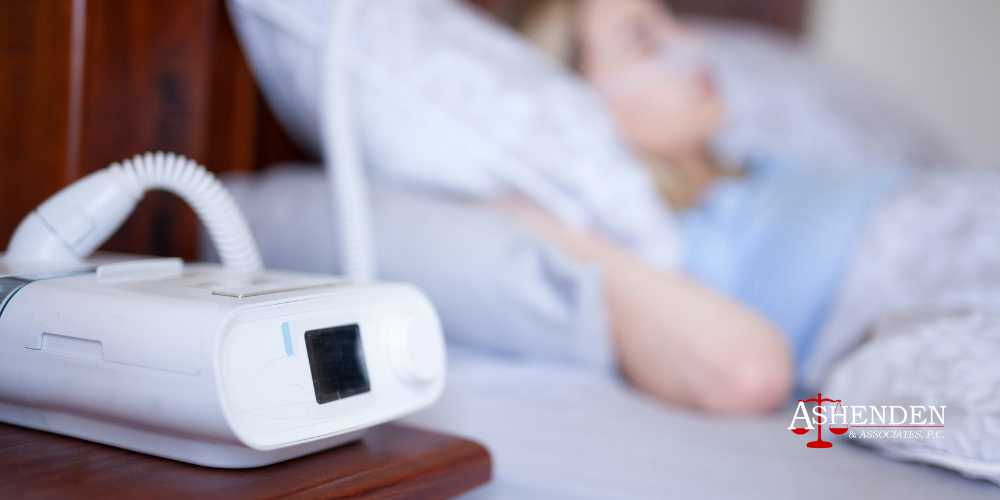
What is Philips Respironics?
Philips Respironics is a subsidiary of Philps, a global electronics company which manufactures and sells respiratory care devices like CPAP and BiPAP machines, as well as other sleep therapy products. They offer both individuals and healthcare providers solutions to respiratory issues and other related problems. In addition to CPAP machines, other Philips Respironics devices include:
- Philips Respironics ventilators
- Philips Respironics nebulizers (breathing treatment machines)
- Philips Respironics oxygen concentrators
- Philips Respironics humidifiers
- Philips Respironics CPAP and BiPAP accessories (masks, tubing, etc)
- Philips Respironics monitoring equipment (oximetry sensors, ECG leads, etc)
What is Sleep Apnea?
Sleep apnea is a sleep disorder where breathing is interrupted or becomes shallow during sleep, with pauses lasting from seconds to minutes and often occurring several times per hour. The main types of sleep apnea are:
- Obstructive sleep apnea (OSA), the most common type, occurs when throat muscles relax too much, causing the soft palate to close the airway. The brain responds by waking the person briefly to restore normal breathing.
- Central sleep apnea (CSA) is less common and happens when the brain doesn’t send the correct signals to respiratory muscles, causing moments without breathing.
- Complex sleep apnea syndrome, or treatment-emergent central sleep apnea, occurs when someone with OSA develops CSA after starting sleep apnea treatment.
These breathing interruptions can lead to oxygen deprivation, fragmented sleep, and loud snoring. Risk factors for sleep apnea include obesity, large neck circumference, smoking, alcohol use, age, sex, family history, and anatomical factors like a narrow airway or enlarged tonsils.
How Do Philips CPAP Machines Work?
Philips CPAP machines work by continuously delivering air through a mask, which is worn over a person’s nose or nose and mouth during sleep. This continuous positive airway pressure helps ensure the user’s airways stay open, allowing the person to breathe throughout the night. It also pushes air into their lungs, making it easier to breathe.
BiPAP machines work similarly, but they use two different kinds of pressure to help induce breathing. It uses higher pressure to help the user inhale, and lower pressure to help the patient exhale, alternating between the two either on a timer or based on the user’s breathing patterns.
In addition to being used as a sleep apnea machine, a BiPAP can also be used for non-invasive ventilation, which can help with those transitioning off of a ventilator or those who don’t quite need to be put on a ventilator.
Recalled Philips CPAP Devices
Certain Philips Respironics ventilators and sleep apnea devices have been recalled due to potential health risks associated with the PE-PUR sound abatement foam used within the product. This voluntary recall affects devices manufactured between 2009 and April 2021 and includes models such as DreamStation CPAP, BiPAP, and ventilators.
Individuals who bought, rented, or used any of the recalled devices may be able to recover compensation for the price of the device and/or the price of replacing the device. They may also receive a $100 award if they return their recalled device to Philips Respironics by August 9, 2024.
Philips CPAP Recall List
There are a number of voluntary Philips recalled CPAP devices. If you purchased any of the following Philips recalled CPAP devices between 2009 and April 26, 2021, your Philips sleep apnea device may be included in the massive Philips CPAP recall. Recalled devices include:
- A-Series BiPAP A30
- A-Series BiPAP A40
- A-Series BiPAP Hybrid A30
- A-Series BiPAP V30 Auto
- C-Series ASV
- C-Series S/T and AVAPS
- DreamStation
- DreamStation ASV
- DreamStation Go
- DreamStation ST, AVAPS
- Dorma 400
- Dorma 500
- E30
- Garbin Plus, Aeris, LifeVent
- OmniLab Advanced+
- REMstar SE Auto
- SystemOne ASV4
- SystemOne (Q-Series)
- Trilogy 100
- Trilogy 200
Philips CPAP Recall Lawsuit
The CPAP recall lawsuits filed against Philips Respironics claim that the company failed to adequately address health risks related to its medical devices. These CPAP lawsuits claim that the PE-PUR foam used in certain Philips devices could degrade over time, and the foam degradation poses various health risks to users.
While victims are now able to recover compensation for their economic losses, many individuals have suffered from serious personal injuries and even wrongful death as a result of the recalled CPAP devices.
Why are People Filing Philips CPAP Lawsuits?
People are filing Philips CPAP machine lawsuits over the dangers of the PE-PUR (polyester-based polyurethane) sound abatement foam used within some of their sleep apnea machines and ventilators. Sound abatement foam can be used in different contexts to help dampen sound and reduce noise and was used within certain Philips Respironics devices to help reduce noise when running.
The foam within the Philips sleep apnea machines has been found to degrade over time, potentially causing small foam particles to be inhaled and ingested by unsuspecting users. The auto CPAP lawsuits claim that these particles have caused users to suffer from serious adverse health effects, including cancer.
Injuries Named in Philips CPAP Lawsuits
CPAP users have suffered from a range of injuries that may have been caused by the sound abatement foam within the defective Philips devices. These injuries include:
- Acute Respiratory Distress Syndrome
- Cancer
- Heart attack
- Heart failure
- Kidney damage
- Kidney disease
- Leukemia
- Liver damage
- Liver disease
- Lung damage
- Lung disease
- Multiple myeloma
- Non-Hodgkin lymphoma
- Papillary carcinoma
- Pleural effusion
- Reactive airway disease
- Respiratory failure
- Severe ear, nose, or throat inflammation
Symptoms of Exposure to CPAP Particles and Chemicals
Individuals who have used a defective CPAP sleep apnea device from Philips may experience certain symptoms as a result of the harmful chemicals within the device’s polyester-based polyurethane PE-PUR foam. These symptoms may include:
- Respiratory issues such as coughing, wheezing, or shortness of breath
- Irritation of the throat, nose, or eyes
- Headaches
- Nausea or vomiting
- Chest discomfort or tightness
- Skin irritation or rash
- Difficulty breathing or worsening of existing respiratory conditions like asthma
- Fatigue or drowsiness
- Cognitive issues such as confusion or difficulty concentrating
If you know you have previously used a recalled Philips CPAP machine or other ventilator and you have experienced any of these symptoms, seek medical attention as soon as possible. The recalled devices have been linked to a number of serious, life-threatening health conditions. It’s important to seek prompt medical treatment to ensure you receive help as soon as possible.
Additionally, not all conditions associated with the recalled devices will result in immediate symptoms, and long-term health concerns like cancer may go unnoticed and untreated. If you know you used a recalled Philips CPAP or other respiratory device, get screened for various forms of cancer and other health conditions related to the components in the recalled devices.
What Kind of Cancer Does the Philips CPAP Cause?
The foam in the recalled Philips CPAP machines has been linked to a number of different types of cancer, including:
- Blood cancer
- Brain cancer
- Breast cancer
- Kidney cancer
- Liver cancer
- Lung cancer
- Lymphatic cancer
- Nasal cancer
- Prostate cancer
- Rectal cancer
- Stomach cancer
- Testicular cancer
- Thyroid cancer
If you’ve been diagnosed with any form of cancer as a result of a Philips CPAP device, contact a Sandy Springs Philips CPAP recall lawyer as soon as possible regarding your legal options. Our CPAP lawyers can help you seek compensation for your losses and ensure the responsible parties are held accountable for their negligence.
What To Do With Recalled CPAP Machines
Recalled devices have important medical uses, so if you have a recalled CPAP machine, you should immediately contact your healthcare provider, as there are known health risks associated with using a recalled medical device.
They may advise you to continue using your Philips sleep apnea device until you get a replacement device, or to stop using the device entirely.
From there, you can register your defective device with Philips. This will allow you to request a replacement and can provide you with information on how to return your defective Philips CPAP machine. Be sure to keep your replacement number, you may be asked for your registration number in future communications with Philips.
After that, it’s important to contact a Philips CPAP recall attorney in your area. They can help you understand your legal rights and options and can help you file a claim for your injuries and other losses. They can also help ensure that you receive compensation through any global settlement awards.
What NOT To Do With Recalled CPAP Machines
If you know that your CPAP machine or other ventilation device has been recalled, it’s important to avoid certain behaviors that could put you at a greater risk of injury or death. According to the Food and Drug Administration, you should not clean your sleep apnea machine with ozone cleaners or UV light cleaners, as these products can cause the foam to degrade more.
Additionally, you should not attempt to remove the sound-dampening foam from your machine and continue using it. In the process of removing the foam, you may cause small pieces of the foam to become dislodged and fall into the machine. These particles could eventually travel through the machine and into your mask, which could put your health at risk.
You should also avoid trying to alter the device in any way, like by adding additional filters or by using a different filter than the one designed for your machine. These devices are designed to help regulate breathing, and altering the device in any way could affect its ability to provide you with air when in use. This could pose a serious health risk.
On top of all of this, modifying the device or cleaning it with harmful cleaners could affect your ability to file legal action against Philips. Before you take any action regarding your defective device, contact your doctor and an attorney. They will advise you on what you should do.
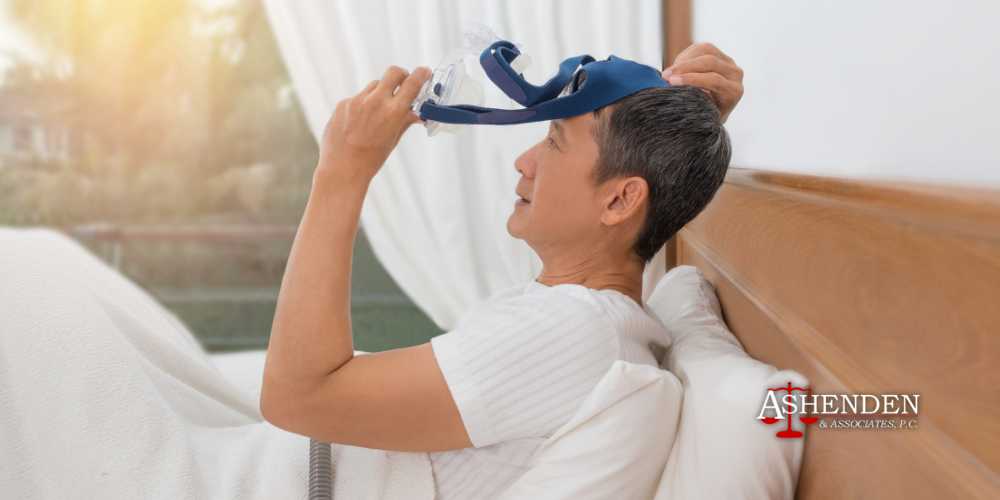
How Do I Join a Class Action Lawsuit Against Philips CPAP Machine?
To join a class-action lawsuit against Philips CPAP machines, you will need to find a law firm or attorney that represents plaintiffs in class action lawsuits and MDLs. You can search for legal firms in your area that are helping clients regarding the Philips CPAP recall, or law firms that have experience handling mass tort product liability or defective medical device cases.
The Philips CPAP recall law firm will be able to assess your eligibility, gather necessary information, and guide you through the process of joining the class action. It’s essential to provide them with any relevant documentation, such as proof of purchase or medical records, to support your claim.
Once you file a CPAP lawsuit against Philips, your attorney will be able to keep you updated on the progress of the case, informing you of any changes to the case. If you are interested in joining the Philips CPAP class action lawsuit, contact the dedicated attorneys at Ashenden & Associates. Our team is dedicated to helping victims of negligence recover compensation for their losses, and are here to ensure you see justice.
Who Qualifies for a Philips CPAP Lawsuit?
In order to qualify for a Philips CPAP lawsuit, you must have:
- Purchased one of the recalled devices between 2009 and April 26, 2023
- Have suffered from injuries or developed health complications as a result of the recalled device
However, even if you did not suffer from any known injuries as a result of the recalled device, you may still qualify to receive compensation for your economic losses through the recent settlement. An attorney can help determine what kind of compensation you qualify for as a result of the recalled Philips CPAP machines.
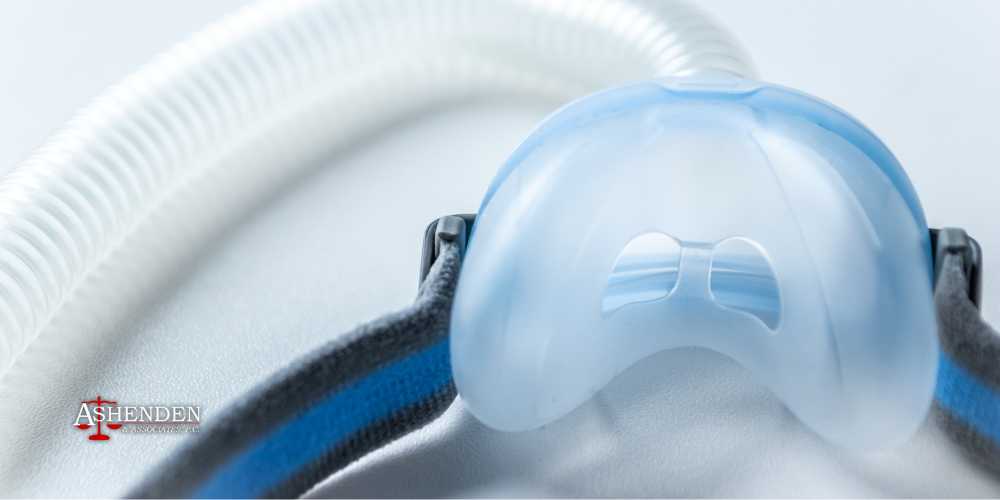
Potential Questions a Philips CPAP Recall Lawyer May Ask to See if You Qualify For a Philips CPAP Lawsuit
If you approach an attorney regarding the CPAP machine recall, they may ask you a number of questions to determine whether or not you qualify. A CPAP lawyer may ask you questions, such as:
- Have you been diagnosed with sleep apnea or a related sleep disorder?
- Did you use any of the Philips CPAP or BiPAP sleep apnea machines that were affected by the recall?
- Have you experienced any health issues or adverse effects while using the Philips CPAP machine?
- Have you been diagnosed with respiratory issues, such as asthma exacerbation or breathing difficulties, while using the device?
- Have you noticed any symptoms such as irritation of the throat, nose, or eyes, headaches, nausea, or skin irritation associated with using the Philips CPAP machine?
- Have you been diagnosed with cancer, and do you suspect a link between your condition and your use of the Philips CPAP machine?
- When did you start using the Philips CPAP machine, and how long did you use it before experiencing any symptoms or health issues?
- Have you sought medical treatment or consulted with healthcare professionals regarding your symptoms or health concerns related to the Philips CPAP machine?
- Do you have documentation, such as medical records or proof of purchase, to support your claim?
- Are you interested in pursuing legal action against Philips for the damages or injuries you have experienced as a result of using their CPAP machine?
These questions help attorneys assess the individual’s eligibility and gather the necessary information to build a case for a CPAP recall lawsuit.
Compensation for Philips CPAP Claims
In a Philips CPAP lawsuit, victims may expect various forms of compensation, depending on the circumstances of their case and the extent of harm suffered. This may include compensation for losses such as:
- Past and future medical treatment
- Lost wages
- Lost earning potential
- Loss of quality of life
- Pain and suffering
- Emotional distress
- Funeral and burial expenses, in the event of a wrongful death
A Philips recall attorney can investigate the circumstances of your unique case and help determine what damages you may be able to recover in a lawsuit. They can also calculate the exact amount of your losses and can fight to ensure you receive full and fair compensation for the damages you suffered.
How Much Is The CPAP Lawsuit Worth?
The amount a victim may recover in a Philips CPAP lawsuit varies widely depending on factors such as the severity of the injuries, the extent of medical expenses incurred, lost wages, and the jurisdiction in which the lawsuit is filed.
Some settlements or jury awards in similar product liability cases have ranged from thousands to millions of dollars. However, each case is unique, and it’s challenging to predict the exact amount of compensation a victim may receive without a thorough evaluation of their individual circumstances.
No personal injury or wrongful death claims in the Philips CPAP MDL have been handled yet, so it’s also hard to estimate how much compensation Philips may be willing to give victims in a CPAP settlement.
Most likely, non-smoking individuals who suffered from serious forms of cancer or who lost a loved one to cancer as a result of the Philips Respironics devices will receive the most compensation. However, other individuals with strong claims may also receive high settlement amounts.
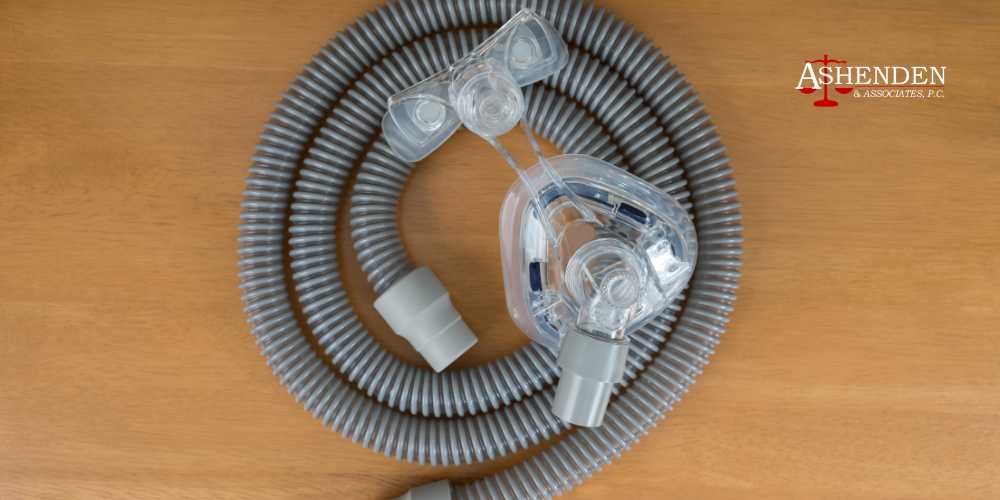
How Can a Sandy Springs Philips CPAP Lawyer Help?
Our Sandy Springs Philips CPAP recall lawyer team is dedicated to assisting individuals who have been harmed by defective CPAP machines, including those affected by the Philips CPAP recall. We understand the complex nature of product liability cases and the challenges faced by victims of dangerous medical devices.
No one should have to worry that their medical device could be causing them to develop a severe health condition like cancer. That’s why our Sandy Springs CPAP lawyers work tirelessly to hold negligent manufacturers accountable for the harm they have caused and pursue maximum compensation for our clients.
When you choose a Sandy Springs Philips CPAP recall attorney at Ashenden & Associates to represent you, you can expect personalized attention and compassionate support throughout the legal process. We will conduct a thorough investigation into the circumstances surrounding your case, gathering evidence to build a strong claim on your behalf. Our goal is to secure the compensation you deserve for medical expenses, lost wages, pain and suffering, and other damages resulting from your injuries.
When you work with us, we make your rights and interests our top priority. We will handle all aspects of your case with professionalism and diligence, and will fiercely advocate on your behalf to ensure you receive justice. And with our long history of successful case results, you can rest assured that your case will be in capable hands.
Atlanta Sandy Springs Philips CPAP Lawyers
If you have been affected by one of the recalled devices from Philips Respironics, you need a strong Sandy Springs Philips CPAP recall lawyer on your side to help you seek justice.
We have the knowledge, resources, and expertise to navigate the complexities of product liability law and hold negligent manufacturers accountable for the harm they have caused. Additionally, with our compassionate and client-focused approach, we ensure our clients receive the personal and legal support they need in this trying time.
Our Philips CPAP recall lawyers will work tirelessly to achieve the best possible outcome for your case. We offer a free case evaluation to all new clients, ensuring that victims of negligence are able to seek legal advice, regardless of their ability to pay. Call Ashenden & Associates today at 770-394-8909 or fill out our online contact form to schedule a free consultation.

